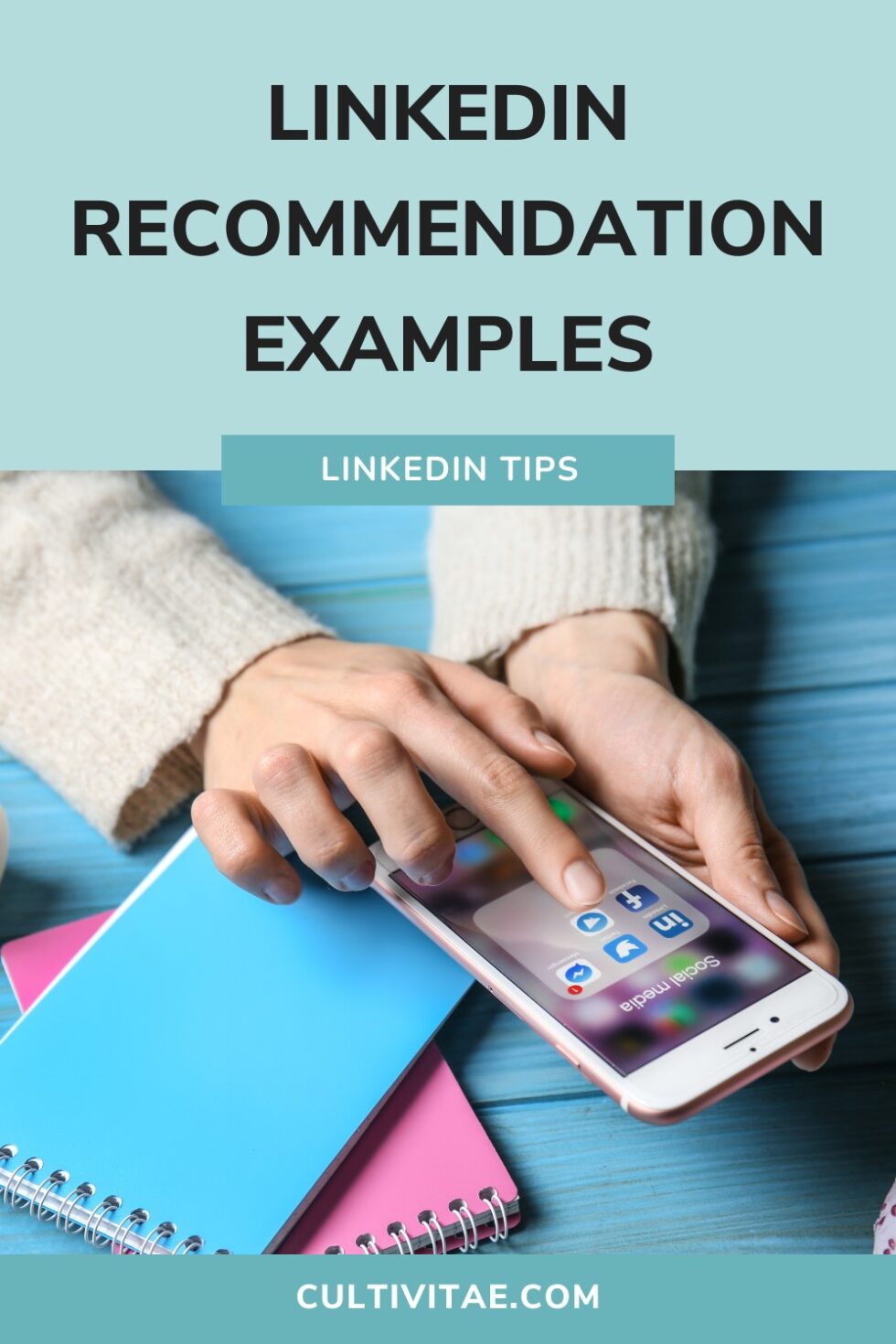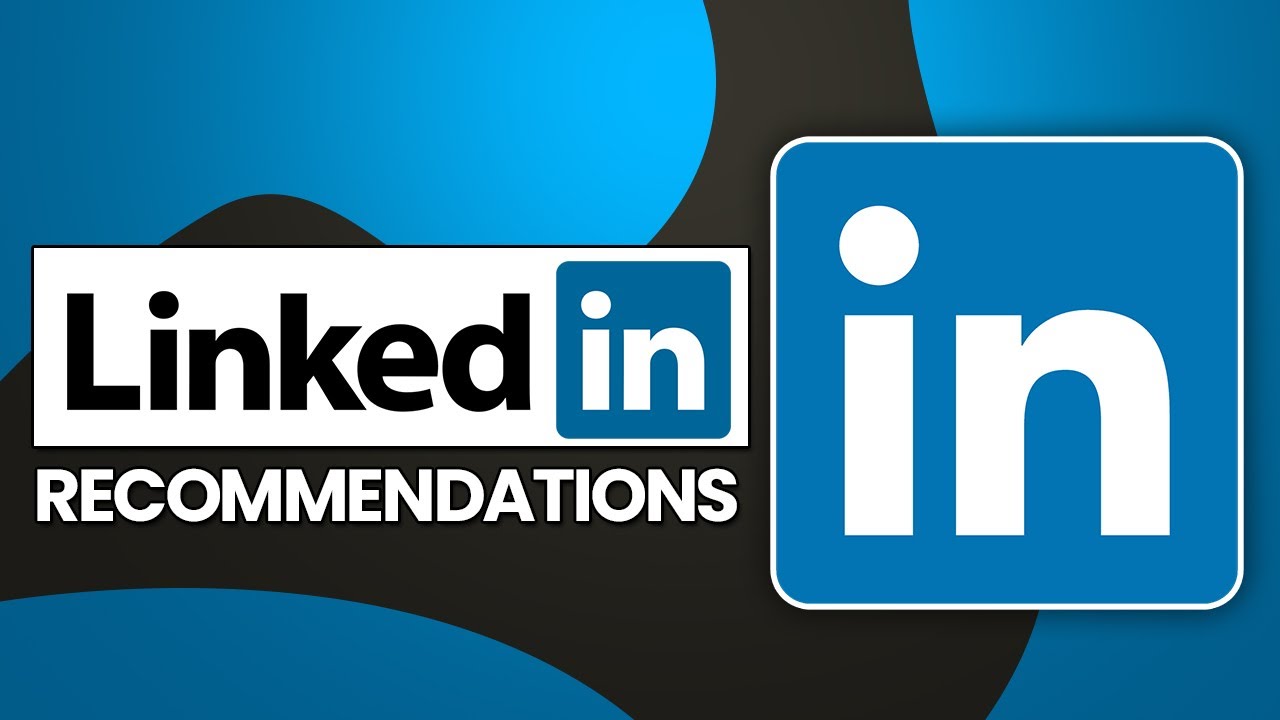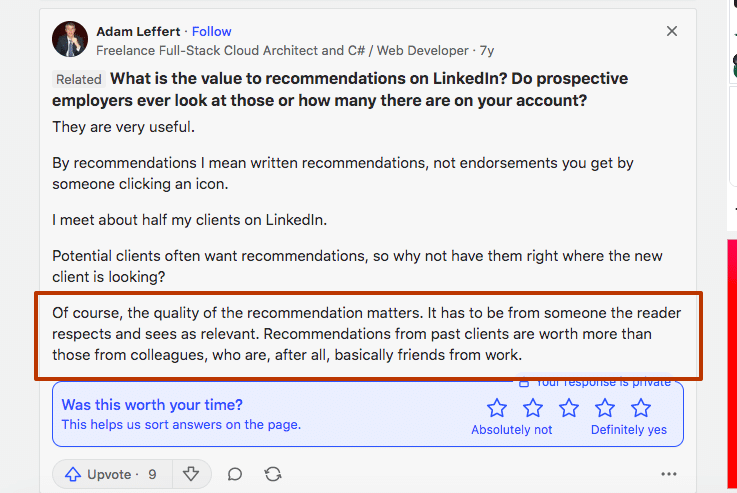In today's digital world, your online presence matters more than ever, especially on platforms like LinkedIn. One essential element of building a strong profile is having recommendations from colleagues, peers, and clients. But how do you ask for one without feeling awkward? In this guide, we’ll delve into the art of asking for LinkedIn recommendations with confidence, ensuring that you not only get the endorsements you deserve but also feel good about the process. Let’s jump right in!
Understanding the Importance of LinkedIn Recommendations

Recommendations on LinkedIn are more than just a nice touch on your profile. They serve several critical functions that can significantly impact your career. Let’s break down why you should prioritize collecting these endorsements.
1. Build Credibility
In an era where employers are looking for trustworthiness, having recommendations can help establish your credibility. When someone takes the time to write a recommendation for you, they are vouching for your skills and character. Here are a few ways they enhance your credibility:
- Validates your skills: A recommendation acts as third-party validation of your abilities.
- Reflects your relationships: Strong relationships in your professional network can amplify your value.
- Increases trust: Endorsements from credible professionals can help others feel more confident in your capabilities.
2. Enhance Your Visibility
Recommendations can also improve your profile's visibility. On LinkedIn, the more endorsements you have, the more likely your profile is to show up in search results. This increased visibility can lead to more networking opportunities and even job offers. Here’s how they impact visibility:
- Search algorithms favor profiles with comprehensive endorsements.
- Hiring managers often prefer profiles that exhibit social proof through recommendations.
- Recommendations can lead to greater engagement on your posts and articles.
3. Showcase Your Career Journey
LinkedIn recommendations tell a story about your career. When people write about your skills or accomplishments, they effectively highlight your journey and growth. Here’s why that narrative matters:
- Showcases soft skills: Recommendations often highlight qualities like teamwork, leadership, and adaptability.
- Details specific projects: Narratives about real-life projects can express your problem-solving skills and achievements.
- Provides context: Recommendations can offer insights into the environments you’ve thrived in, such as startups or well-established companies.
4. Offer Guidance for Future Employers
Employers are not just interested in what you can do, but also how you relate to others. A well-written recommendation can illuminate your working style and interpersonal skills—critical factors for any employee. Consider these points:
- Describes your fit in a team: Employers love insights into how you collaborate with others.
- Sheds light on your work ethic: Recommendations can provide anecdotes of your dedication and commitment.
- Potential red flags: Honest feedback can give future employers a realistic view of areas where you might need growth.
To sum up, requesting LinkedIn recommendations is not just a mere addition to your profile; it’s a strategic move that can greatly assist in advancing your professional journey. Whether you're just starting out or looking for new opportunities, having robust recommendations can make a world of difference in how others perceive your capabilities. So, let’s move on to the next steps involved in confidently asking for those all-important recommendations!
Also Read This: Adding Languages to Your LinkedIn Profile: Simple Tips to Stand Out
3. Choosing the Right Person to Ask for a Recommendation

When it comes to asking for LinkedIn recommendations, the first step is knowing who to ask. Not everyone in your network will be the right fit for this request. Here are a few tips to help you choose wisely:
- Look for Relevance: Consider individuals who are familiar with your work and can speak to your skills and contributions. Think about colleagues, supervisors, or clients whom you’ve had a positive impact on. They can provide specific examples that showcase your strengths.
- Status Matters: While it's great to get endorsements from former colleagues, recommendations from higher-ups or industry leaders carry more weight. Aim for people who have some authority or respect in your field.
- Recency is Key: Recommendations from individuals you worked with recently are generally more relevant. They’ll have a fresher perspective on your work ethic and accomplishments, which can make your recommendation more impactful.
- Quality over Quantity: It’s not about how many recommendations you have, but rather the quality of those testimonials. Choose individuals who can provide detailed, specific feedback that highlights your skills and achievements rather than generic praise.
- Sincerity Matters: It’s important to ask someone who genuinely appreciates your work. If they had a positive experience working with you, this enthusiasm will come through in their recommendation.
After considering these points, make a list of potential candidates. Take a moment to think about your past relationships—who did you enjoy working with the most? Who can best articulate your strengths? Once you have a solid list, you’ll feel more confident in making your request.
Also Read This: How to Hide Your Birthday on LinkedIn
4. How to Approach the Request

Now that you’ve identified the right person to ask for a recommendation, it’s all about how you approach them. The way you frame your request can make all the difference! Here are some tips to ensure your approach is both polite and effective:
- Personalize Your Message: Avoid sending a generic request. Instead, take the time to craft a personalized message. Mention how you know the person and recall specific projects you worked on together. This not only shows that you value your relationship but also jogs their memory about the work you did.
- Be Clear and Direct: State your request clearly. You might say something like, “I’m updating my LinkedIn profile and would be grateful if you could write a recommendation for me based on our time working together.” You don’t want to leave the other person guessing what you’re asking.
- Provide Context: Share what you’re hoping to achieve with the recommendation. Are you applying for a new job, looking to transition to a different field, or simply trying to enhance your professional profile? Giving context can help the person craft a more relevant recommendation.
- Offer to Help: Sometimes people hesitate to write recommendations because they don't know what to say. Consider offering assistance by mentioning key projects, skills, or accomplishments you’d like them to highlight. This gives them a foundation to work from.
- Give Them Time: Remember that people have busy schedules. Be patient and give at least a couple of weeks for them to respond. If you don’t hear back, it’s perfectly fine to send a polite follow-up message.
By approaching your request with thoughtfulness and respect, you set the stage for not just a recommendation, but also potentially strengthen your professional relationship. So, don’t hesitate—reach out and ask for that recommendation! You've got this!
Also Read This: What is LinkedIn and How Does It Work: A Complete Guide to Understanding LinkedIn
5. Crafting Your Message for Maximum Impact
Now that you’re ready to ask for a recommendation, it's time to shine when crafting your message. This is your shot to make a great impression, so let's make it count! Here are some key points to include in your request:
- Personal Touch: Start with a friendly greeting. Address the person by name and mention something personal or relevant about your connection—maybe a project you worked on together or a memorable conversation.
- Be Clear and Specific: Explicitly state that you’re seeking a recommendation and specify the context. For example, are you looking for insights on your leadership skills, teamwork, or a particular project? The clearer you are, the easier it is for them to write something meaningful.
- Remind Them of Contributions: Briefly outline the work you did together. You might say, “I really appreciated your support during our project on XYZ, and I think it showcased my abilities in ABC.” This jogs their memory and sets the stage for what you’d like them to highlight.
- Keep It Short and Sweet: Your request doesn’t need to be lengthy. Be concise—people are busy! A few well-crafted sentences can go a long way. Aim for clarity without overwhelming them with details.
- Express Appreciation: Finally, thank them in advance for considering your request. A little gratitude can go a long way in fostering goodwill.
Here’s an example message that encapsulates these tips:
Hi [Name],
I hope you’re doing well! I really enjoyed working with you on the [specific project] and appreciated your insights throughout our collaboration. I’m currently looking to enhance my LinkedIn profile and would be grateful if you could write a recommendation for me focusing on [specific skills or experiences]. I’ve learned so much from you, and it would mean a lot to me if you could share your perspective. Thank you in advance for considering this!
By following these guidelines, you’ll increase your chances of receiving a glowing recommendation that truly reflects your skills and contributions!
Also Read This: How to Find Hiring Managers on LinkedIn for Job Opportunities
6. Following Up Gracefully
So, you’ve sent your message and now you're waiting anxiously for a response. It’s natural to feel a bit impatient, but patience is key! Following up gracefully is just as important as the initial request. Here’s how to do it right:
- Give It Time: It’s important to allow at least a week before you reach out again. People have busy schedules, so don’t take a delayed response personally.
- Send a Gentle Reminder: If you haven’t heard back after a week, it’s perfectly acceptable to send a polite follow-up message. Keep it light and friendly—something like, “Hi [Name], I hope you’re doing great! I wanted to check in regarding my request for a LinkedIn recommendation. I understand you’re busy, but your input would be invaluable to me!”
- Be Understanding: If they express that they’re too busy or can’t write one after all, be gracious. A simple “Thank you for letting me know! I completely understand—perhaps we can catch up another time?” goes a long way in maintaining your professional relationship.
- Show Appreciation: Regardless of whether they ultimately provide a recommendation, thank them for considering your request. Acknowledging their effort fosters goodwill and opens doors for future collaboration.
Following up isn’t about being pushy; it’s about keeping lines of communication open and showing that you value their insights. So, don’t hesitate! A gentle reminder can be just the nudge they need to share their thoughts on your amazing skills.
Also Read This: How to Delete a Message in LinkedIn: Managing Conversations Effectively
7. What to Do After Receiving the Recommendation
Congratulations! You've successfully navigated the somewhat daunting process of asking for a LinkedIn recommendation and received a glowing review. Now, what should you do next to maximize this valuable addition to your professional profile? Here are a few steps to consider:
- Express Gratitude: The first thing you should do is thank the person who took the time to write you a recommendation. A quick message or a personal note expressing your appreciation goes a long way in maintaining a positive relationship. You might say something like, “Thank you so much for taking the time to write me a recommendation! I truly appreciate your support.”
- Share It: Once the recommendation is posted on your profile, share it! You can create a LinkedIn post highlighting the recommendation and thanking the person again, which not only shows gratitude but also helps increase your visibility on the platform.
- Add it to Your Portfolio: If applicable, consider including the recommendation in your professional portfolio or website. This can reinforce your personal brand in contexts outside of LinkedIn.
- Update Your Profile: Make sure your profile is up-to-date. Highlight key skills mentioned in the recommendation. This can make your profile more appealing to recruiters and potential connections.
- Reciprocate: If the person who wrote the recommendation for you hasn’t already gotten a recommendation from you, consider returning the favor. Write them a thoughtful recommendation based on your experiences together. This practice fosters a network of mutual support.
- Use It in Job Applications: When applying for new opportunities, refer back to your recommendations in your cover letter or during interviews. Mention how those specific skills or experiences were highlighted in the recommendation, linking it back to why you’re a great fit for the role.
Taking these steps can enhance not only your profile but also your professional relationships. Remember, the digital world is all about connections, and a good recommendation can be a powerful tool in strengthening yours!
8. Conclusion
Asking for LinkedIn recommendations may feel intimidating, but with a bit of preparation and a positive mindset, you can approach the task with confidence. Recommendations serve as crucial endorsements in today’s professional landscape, helping to distinguish you among a sea of talent.
Remember to:
- Choose the Right People: Select individuals who genuinely know your work and can speak to your skills and contributions.
- Personalize Your Requests: Customize your approach based on your relationship with the person, making it more personal and less transactional.
- Stay Professional: Maintain a professional tone in your communication, while also being authentic.
- Follow Up: If you haven’t received your recommendation in a timely manner, it’s okay to politely follow up.
- Leverage Your Recommendations: Once you have some strong testimonials, remember to use them effectively across your job applications and networking efforts.
By understanding the importance of recommendations and following these simple guidelines, you can build a compelling LinkedIn profile that not only showcases your skills but also reflects the valued relationships you've created throughout your career. So, go ahead—ask for that recommendation! You'll be glad you did.
 admin
admin








